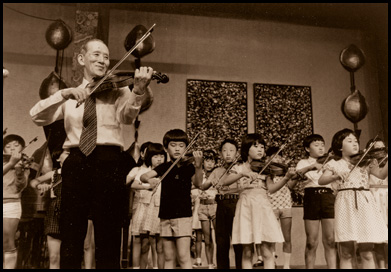Musical ability is not an inborn talent but an ability which can be developed. Any child who is properly trained can develop musical ability, just as all children develop the ability to speak their mother tongue. The potential of every child is unlimited.
— Shinichi Suzuki
Over fifty years ago, the Japanese violinist Shinichi Suzuki developed a teaching method stemming from his recognition that virtually all children learn to speak their native language. Dr. Suzuki called his method the mother-tongue approach, though today it is most commonly referred to as the Suzuki Method. The basic principles are as follows:
Every Child Can Learn
Everyone believes that all children have the ability to learn language and that all children should be taught to speak, read, and write. When given the proper environment, every child can learn to create music.
Parental Involvement
It goes without saying that parents play an essential role in teaching their child to speak. The parents’ role in their child’s musical education is equally vital. Suzuki spoke of a triangle between the student, teacher, and parent, in which each member must contribute equally. Being part of a Suzuki program requires a commitment on the part of the parents. Depending on the age of the child, parents are often taught the basics of playing the violin so that they can better help their child at home. As most of a child’s learning takes place at home, parents serve as the home teacher. The parents’ responsibilities include attending every lesson with their child, guiding the child’s practice, creating a supportive learning environment at home, providing daily opportunities to listen to the Suzuki CD, and enriching the child’s musical environment by attending concerts together.
Early Start
Children are immersed in language from the moment they are born. While it is never too late to begin learning an instrument, being exposed to music from a young age greatly facilitates learning.
Listening to an Aural Model
Children learn to speak by imitating the sounds that surround them. Suzuki students listen to music every day to become familiar with the vocabulary of music.
Positive, Nurturing Environment
When children begin to speak, their efforts are met with enthusiasm and wonder. Parents never scold a child for mispronouncing a new word; instead, the child is encouraged to repeat the word over and over until it is mastered. An equally positive environment is necessary for a child to learn music.
Learning to Speak before Learning to Read
There is a common misconception that Suzuki-trained students do not learn to read music. This is not so. Just as children learn to read only after they have achieved the ability to speak with ease, Suzuki students begin to read music only after developing a solid technical foundation. It is necessary to have this foundation before beginning to read music so that the student can concentrate more fully on learning to play the instrument.
Repetition
Just as a child must repeat a word many times before it is mastered, repetition is essential to learn the skills involved in playing the violin.
Review and Repertoire
In general, children remember the new words they learn and eagerly use them. Suzuki students constantly review the repertoire they have learned. This both reinforces technical skills and memory and provides countless opportunities to experiment with musical expression. Most importantly, through continued review, students become accustomed to the feeling of playing with ease.
Group Learning
In addition to receiving private lessons, Suzuki students participate in group classes. Musical performance is rarely an individual activity; most often, music is performed with others, whether as a string quartet, orchestra, or as a solo with piano accompaniment. One of the greatest benefits of group class is that it develops the skills needed to perform music as part of an ensemble. Group classes build on concepts learned in private lessons and are an excellent source of motivation. They give children the opportunity to share music with each other, make friends, and learn from their peers. Group classes also offer the valuable experience of performing in front of a supportive audience, leading to confidence and comfort with performing.

